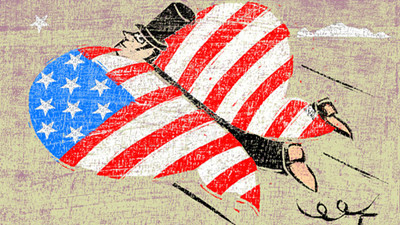(单词翻译:单击)
中英文本
Butterflies in America
美国的蝴蝶
To marvel at all things
所有事都值得惊奇
A splendid twinning of natural science and America
自然科学与美利坚民族的完美结合
Butterfly People: An American Encounter with the Beauty of the World.By William Leach.
蝴蝶客:美国与世界之美的相遇
“BUTTERFLIES and butterflies”, wrote Walt Whitman, “continue to flit to and fro, all sorts, white, yellow, brown, purple”. Whitman may have had an eye for colour, but as a mere journalist and poet with perhaps a touch of lepidopterophilia, he does not quite qualify as one of William Leach's “Butterfly People”.
“蝴蝶、还是蝴蝶”,沃尔特惠特曼写道,“它们不停地来回飞过,各种各样的,有白的、黄的、棕色的还有紫色的”。惠特曼对颜色是有判断力,但是仅仅作为一位知道点鳞翅类昆虫的记者和诗人,并不是威廉所称的“蝴蝶客”
True butterfly people were far more serious. They were enthusiasts and obsessives who took advantage of the unfettered access to undeveloped land afforded by a young country pressing its frontier westward. They were artisans and aesthetes: scientists of a sort that gradually ceased to exist as the natural sciences grew more formal and mature.
真正的蝴蝶客远远严谨的多。他们狂热而迫切,年轻的国家正在向西部扩充领土,所以他们可以利用这种优势,自由使用未开发的土地。他们是手艺人兼审美家:这类所谓的科学家,随着自然科学发展得更加正式和成熟,这类科学家渐渐不存在了。

Mr Leach's compelling thesis is that 19th-century America provided a uniquely hospitable time and place for lovers, and especially collectors, of butterflies. Agricultural toil and westward expansion brought droves of ordinary people into intimate contact with vast expanses of pristine lands. Most 19th-century Americans, Mr Leach writes—uncharitably but probably accurately—saw nature “as something to dig up or harvest from the earth or to be torn down and transformed into real estate or money”, and yet because there was so much untouched land, even the most rapacious miner or builder would in the course of his life come into contact with the natural world on a scale and in a way unknown to Americans today.
里奇先生的有趣命题是:19世纪的美国为蝴蝶爱好者,特别是收藏家提供了一个独一无二的热情好客的时代。农业耕作和西部扩张将大批的普通人与广袤无际的未开垦土地紧密联系在一起。大多数19世纪的美国人,里奇先生写道,视自然为“可以从地下挖掘或从地上收割的,可以推倒盖房子或者卖钱的东西”,他的评语尽管尖刻,却也许十分精准。可是因为有如此之多未开垦的土地,即使是最贪婪的财主和建设者也会在他一生中与大自然发生联系,这种联系无论从规模上、在形式上, 都是如今的美国人无法想象的。
Perhaps more important, “natural science” had not yet become “biology”. It was practised out of doors rather than in a laboratory, and aside from the classification madness of Linnaeus, it was light on systems and formality. Its early titans, such as Charles Darwin and Alexander von Humboldt, a Prussian aristocrat whose masterwork, “The Cosmos”, began being published in 1845, “seemed indifferent to drawing lines between art and science,” Mr Leach writes. “Their prose was often excellent and readable, so much so as to later seem unscientific. They often wrote on behalf of the artistic attractions of nature.” They led with a sense of curiosity driven by rapture and wonder. Natural science belonged not to the trained and pedigreed biologist, but to the passionate amateur: they were “naturalists”, not biologists.
或许更重要的是,“自然科学”没有发展为“生物学”。它的研究在户外进行而不是在实验室,不像林奈繁杂的分类法,体系和形式是次要的。有关研究它的早期的泰斗,像查尔斯达尔文,以及亚历山大洪堡特,一位在1845年出版名著《大宇宙》的普鲁士贵族,“似乎对划分科学与艺术的界线漠不关心”,里奇先生写道。“他们写的散文总是出色易懂,以至于对后人来说显得不科学,他们常常为了自然的艺术吸引力而写文章。”他们引领了一种由狂喜和惊奇驱使的好奇感。自然科学不属于受过训练的正统生物学家,但却属于热情激昂的业余爱好者:他们是“博物学家”,而不是生物学家。
Butterfly people learned by observing, thinking and arguing. They included Samuel Scudder, who named the monarch butterfly and wrote a magisterial, three-volume work about North American butterflies that won raves from lepidoptery's literary champion, Vladimir Nabokov, 70 years after its publication. Another was William Henry Edwards. His great grandfather was America's most renowned Puritan theologian, and he eventually wrote his own three-volume doorstop.
蝴蝶客们从观察、思考和争论中学习。他们中包括萨缪尔斯卡德,他命名了黑脉金蝴蝶,写了一本关于北美蝴蝶的三卷的权威著作,这部书出版70年后令鳞翅类昆虫的文学巨匠弗拉基米尔纳博科夫惊叹不已。另一位是威廉亨利爱德华。他了不起的祖父是美国最有名望的普鲁士神学家,他最终写出了自己三卷鸿篇巨著。
Mr Leach is at his best when profiling men such as Edwards, Scudder and others, including solitary, taciturn Herman Strecker and resentful, bilious Augustus Grote. These are the amateur giants on whose broad shoulders much contemporary biology and entomology rests.
里奇先生最擅长介绍爱德华、斯卡德等等,包括沉默寡言的隐士斯特雷克和坏脾气的奥古斯塔斯格罗特。当代生物学和昆虫学正是站在这些业余研究巨匠宽阔的肩膀上。
词语解释
1.continue to 继续
We will continue to reduce that exposure.
未来,我们还将继续减持。
So will kweichow moutai continue to struggle during the year of the snake?
因此,贵州茅台在蛇年里还会继续苦苦挣扎吗?
2.take advantage of 利用
Take advantage of inside and outside advisers at school.
充分利用校内外的顾问资源。
How can you take advantage of their support?
你将如何利用他们支持的优势?
3.cease to 停止
Can I cease to love thee?
我能停止爱你吗?
Eventually, globalisation will cease to be a dirty word.
最终,全球化将不再是一个肮脏的词汇。
4.provide for 为…作准备;规定
There are no known laws that provide for public access to government information.
没有发现哪部法律规定了对政府信息的公开制度。
Even if egypt's islamists refrain from scrapping the peace treaty, israel fears they will seek to amend the clauses that provide for sinai's demilitarisation.
就算埃及的伊斯兰当政者没有废除戴维营和平协议,以色列依然害怕埃及将修改那些规定西奈半岛非军事化的条款。


